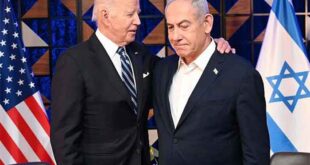 DUBAI (Reuters) – Leaders of Pakistan’s month-old ruling alliance narrowed differences on Thursday over the reinstatement of judges ousted by President Pervez Musharraf to calm fears that the coalition was about to break up.
DUBAI (Reuters) – Leaders of Pakistan’s month-old ruling alliance narrowed differences on Thursday over the reinstatement of judges ousted by President Pervez Musharraf to calm fears that the coalition was about to break up.
“The meeting has made progress in a very positive way. We are now satisfied,” former prime minister Nawaz Sharif told journalists after holding a second day of emergency talks with Asif Ali Zardari, widower of the late Benazir Bhutto.
The parties of Sharif and Zardari, who took over leadership of the Pakistan People’s Party after his wife’s assassination, defeated Musharraf’s allies in a parliamentary poll in February.
They formed a government after forging a post-election alliance, but they have been at loggerheads over an unfulfilled promise to bring back the judges Musharraf removed when he imposed emergency rule for six weeks in November.
Sharif and Zardari, whose PPP heads the four-party coalition, had pledged their government would pass a resolution in the National Assembly to bring the judges back within a month of being sworn in.
That self-imposed deadline passed on Wednesday. Speaking after consultations with Zardari in Dubai, Sharif said the resolution would be passed, regardless of the delay.
“There is no ambiguity, there is no doubt about it,” Sharif said. “The restoration would take place through a resolution … the details will be revealed tomorrow.”
The leadership of Sharif’s Pakistan Muslim League (Nawaz), better known as PML-N, is due to meet in the eastern Pakistani city of Lahore on Friday.
Information Minister Sherry Rehman, a senior PPP leader, expressed confidence in the outcome of the talks in Dubai.
“We are very satisfied with the results of the talks… (There is) nothing to worry about, really,” Rehman told Reuters.
The talks took place in Dubai because Zardari had gone there at the weekend to see his daughters at the home where Bhutto had lived until her return from self-exile in October.
MILITANCY CHALLENGE
The PPP-led government of Prime Minister Yousaf Raza Gilani needs stability to address the challenge of Islamist militancy and economic problems in the shape of widening trade and fiscal deficits, rising inflation, and increasing power cuts.
Western allies in the war on terrorism dread nuclear-armed Pakistan sliding into a prolonged period of political stability.
Sharif, the prime minister Musharraf overthrew in 1999, wants the judges brought back as a first step to driving his usurper out of the presidency.
The restored judges could revive challenges to the legitimacy of Musharraf’s re-election in October by an outgoing parliament while still army chief.
Zardari, however, is trying to avoid an early confrontation with Musharraf who retired from the army in November.
The PPP wants to link reinstatement of the judiciary to a constitutional reform package that will include measures to shorten the tenure of senior judges.
The constitutional reforms are also expected to strip Musharraf of presidential powers to dismiss the government.
The PPP leadership harbors doubts about some judges, notably Iftikhar Chaudhry, the Supreme Court Chief Justice whose defiance of Musharraf galvanized the opposition last year.
The PPP favors reinstating Chaudhry and then forcing him to retire, while Sharif’s party is negotiating to allow the judge to stay on until 2010, according to sources familiar with the talks.
 Eurasia Press & News
Eurasia Press & News



